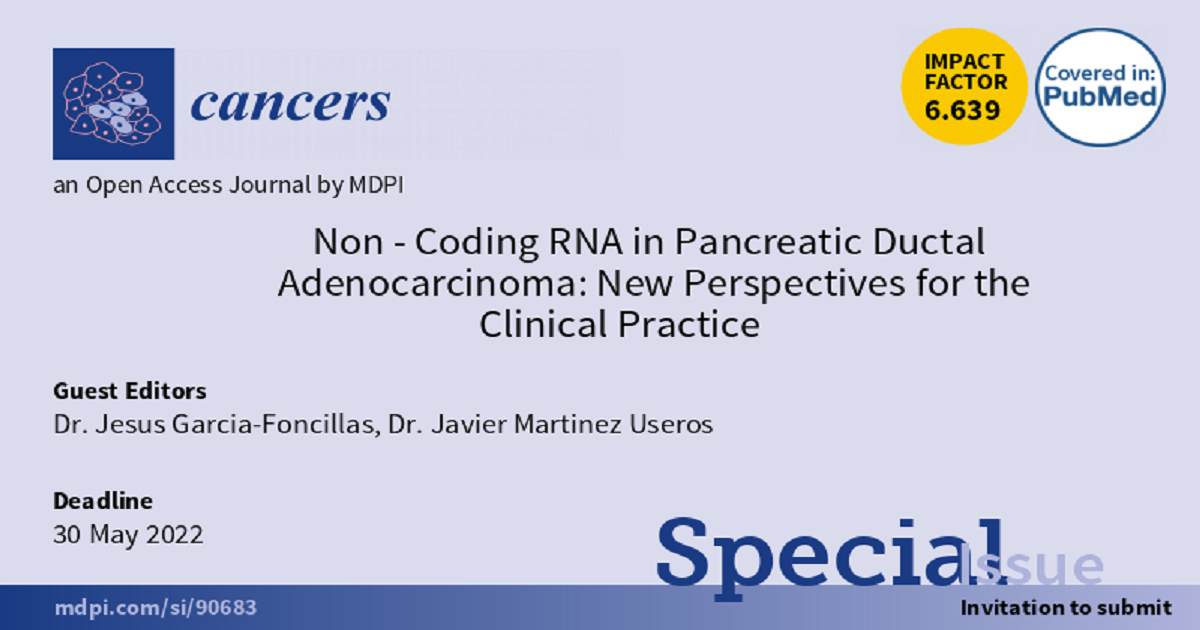Non-Coding RNA in Pancreatic Ductal Adenocarcinoma: New Perspectives for the Clinical Practice
A special issue of Cancers (ISSN 2072-6694).
Deadline for manuscript submissions: closed (30 May 2022) | Viewed by 706

Special Issue Editors
Interests: predictive biomarkers; colorectal cancer; gastrointestinal cancer; new drugs in GI cancer
Special Issues, Collections and Topics in MDPI journals
Interests: gastric cancer; pancreatic cancer; colorectal cancer; metastatic melanoma
Special Issues, Collections and Topics in MDPI journals
Special Issue Information
Dear Colleagues,
Pancreatic cancer incidence has increased in developed countries, and it is anticipated to become the second biggest cause of cancer-related deaths by 2030. The 5-year survival rate is 50% when tumors are <2 cm in size and close to 100% for tumors <1 cm; unfortunately, pancreatic cancer is normally asymptomatic, and patients are treated as outpatients. Therefore, in 80% of cases, this type of tumor is diagnosed when it has metastasized to distant organs. In those cases, surgical resection based on the Whipple procedure, or its modifications, is not recommended. Additionally, there are no target therapies nor immune-checkpoint inhibitors that can treat these patients, and adjuvant therapy is usually based on cytotoxic and anti-metabolites that rarely contribute toward survival and are mostly used with a palliative intent.
Therefore, there is a clinical need for new diagnostic biomarkers to achieve an early detection of patients to offer surgery first as a curative method and new treatment approaches. Since non-coding RNA is small enough to travel via bodily fluids without degradation, it presents promising potential as an early diagnostic biomarker even via liquid biopsy methodologies. Furthermore, non-coding RNA targets several oncogenes, allowing proliferation arrest, dedifferentiation regulation to a stemness phenotype, apoptosis induction, and inhibition of epithelial-to-mesenchymal transition to hamper pancreatic cancer cell migration and invasion of vital organs. In this regard, small interfering RNAs (siRNAs), microRNAs (miRNAs), Piwi-interacting RNA (piRNAs), or long non-coding RNAs (lncRNAs), among others, could help in the routine clinical management of pancreatic cancer patients.
Dr. Jesus Garcia-Foncillas
Dr. Javier Martinez Useros
Guest Editors
Manuscript Submission Information
Manuscripts should be submitted online at www.mdpi.com by registering and logging in to this website. Once you are registered, click here to go to the submission form. Manuscripts can be submitted until the deadline. All submissions that pass pre-check are peer-reviewed. Accepted papers will be published continuously in the journal (as soon as accepted) and will be listed together on the special issue website. Research articles, review articles as well as communications are invited. For planned papers, a title and short abstract (about 250 words) can be sent to the Editorial Office for assessment.
Submitted manuscripts should not have been published previously, nor be under consideration for publication elsewhere (except conference proceedings papers). All manuscripts are thoroughly refereed through a single-blind peer-review process. A guide for authors and other relevant information for submission of manuscripts is available on the Instructions for Authors page. Cancers is an international peer-reviewed open access semimonthly journal published by MDPI.
Please visit the Instructions for Authors page before submitting a manuscript. The Article Processing Charge (APC) for publication in this open access journal is 2900 CHF (Swiss Francs). Submitted papers should be well formatted and use good English. Authors may use MDPI's English editing service prior to publication or during author revisions.
Keywords
- pancreatic cancer
- microRNA
- lncRNA
- piRNA
- pancreatic cysts
- predictive biomarkers
- novel therapies
Benefits of Publishing in a Special Issue
- Ease of navigation: Grouping papers by topic helps scholars navigate broad scope journals more efficiently.
- Greater discoverability: Special Issues support the reach and impact of scientific research. Articles in Special Issues are more discoverable and cited more frequently.
- Expansion of research network: Special Issues facilitate connections among authors, fostering scientific collaborations.
- External promotion: Articles in Special Issues are often promoted through the journal's social media, increasing their visibility.
- Reprint: MDPI Books provides the opportunity to republish successful Special Issues in book format, both online and in print.
Further information on MDPI's Special Issue policies can be found here.







